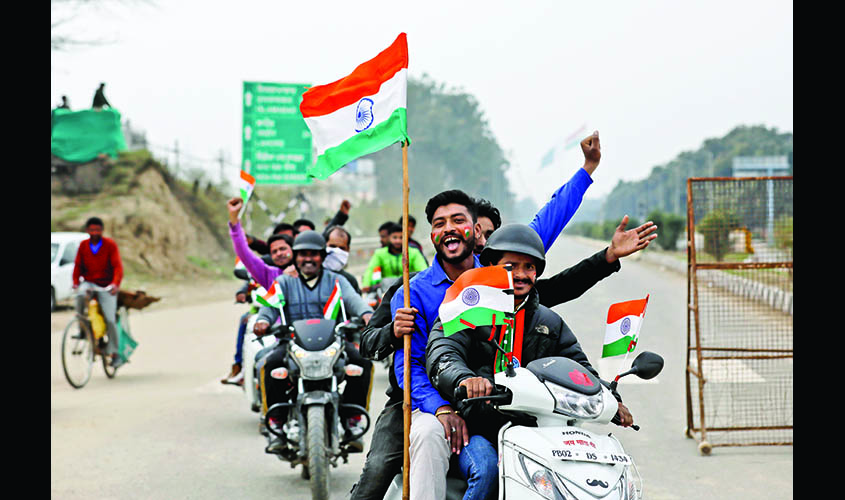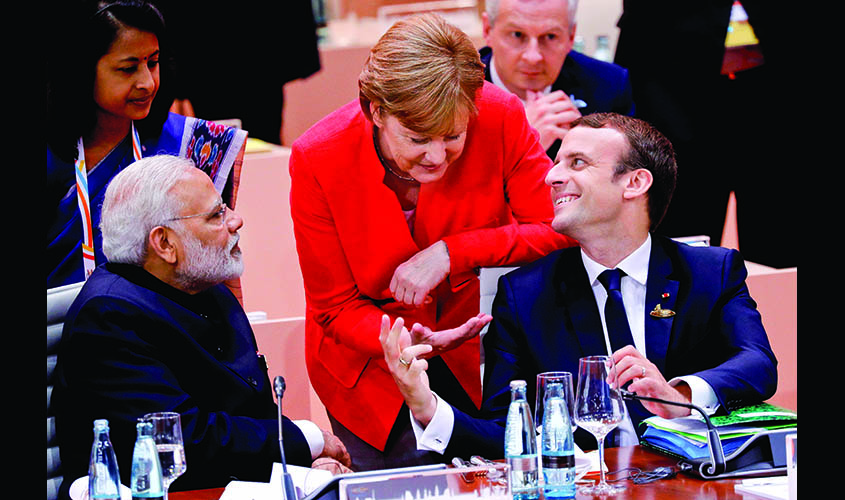The global community is not accepting Pak’s denial or offers to take action once ‘actionable evidence’ is found.
WASHINGTON DC: The return of the Indian Air Force “hero” pilot Abhinandan Varthaman within two days of his capture by Pakistan not only saved the sub-continent from the “perils of war”, it also stamped the “hard global diplomacy” of India under Prime Minister Narendra Modi. The 48 hours after the capture of the Indian Air Force pilot were not only a litmus test for PM Modi, but in the end it answered many who have been questioning and taking the occasional jibe on his “record globe-trotting trips”.
Perhaps the dividend of those trips were returned to India in form of IAF pilot Varthaman without the country entering into a full-blown war, even as it lived that situation very close in the past week or 10 days. The world stood by India and the global pressure on Pakistan, including from its “close friend China”, compelled its Prime Minister Imran Khan to start talking “peace and regional development”. Perhaps in those sermons of “war miscalculations” he was giving to international media to influence them, something he’s good at, he factored in Pakistan’s tattered global image and the fact that the world powers had dumped him—virtually no-one stood behind him, not even Saudi Arabia and the Organisation of Islamic Conference.
The final nail was the strong warning from President Donald Trump to Pakistan to show results against terror activities from its soil and ensure peace. The “rogue” neighbour obliged immediately to “superpower America”.
Many from the Indian diaspora here in the United States say that “much of this Pakistan taming can be credited to PM Modi’s personal global ties. Many warm-hug picture frames of Modi and Trump and with other world leaders come to mind and they are worth it.”
India watchers and experts on South Asia are hailing it as a big “diplomatic victory” for India as some even say that this is the strongest Indo-US relations ever and US doesn’t need to fight with India in a war, if there is one. It can play a far bigger role in “isolating Pakistan”. The US also helped with respect to the UNSC statement issued soon after Pulwama. Secretary Mike Pompeo’s latest statement urging both countries to be restrained re-emphasised the need for Pakistan to act against terrorism.
Richard M. Rossow, senior adviser and Wadhwani Chair in US-India Policy Studies at Center for Strategic & International Studies (CSIS) in Washington DC says: “The United States has clearly sided with the Indian position. But I would not expect intense ‘shuttle diplomacy’ or heavy-handed attempts at intervention in this low-intensity conflict, unless it dramatically escalates. Instead, the United States may help play a role in India’s non-military attempts to isolate Pakistan. Organising the international community to cut down terrorist financing tools, naming additional groups and players as terrorist organisations and leaders, and other thrust areas that will play out in the global arena. Pakistan has few friends left in the world, and India has a great deal of credibility and partnerships.”
On asked if he sees this still escalating into a larger conflict involving more nations, Rossow told The Sunday Guardian: “I do not see any chance of this erupting into a wider conflict involving other nations. Pakistan bears the guilt for what happened, and India has the military and diplomatic strength to handle (such a situation). I do not see other players intervening.”

A keen political watcher of India’s right wing politics, Professor Walter Andersen doesn’t call it a “straight victory”, but gives credit to Modi’s restraint. Dr Andersen, who is Director of South Asia Studies Program at the Johns Hopkins University, says: “Most countries (and press commentary) are for a drawdown and avoidance of provocative actions. Imran Khan was smart to call for peace talks and return the pilot. Modi has been quite restrained in responding to this. But the underlying issue that triggered these events is terrorism and here Imran Khan has a huge issue keeping the radical grounds under control, even if he wanted to do so.” He cautions India by saying, “I predict they will strike again when they can…There is cross political support for tough action as a response to another terrorist attack from a Pakistan-based organisation.”
Some like Dr Aparna Pande of Hudson Institute advocates for a “continued tough stand by PM Modi”.
“This is India’s victory and it should be considered as one. Pakistan is facing increasing global isolation with major countries around the world and even the United Nations Security Council issuing statements that condemn the Pulwama terror attack and explicitly call upon Pakistan to take action against terror groups. Even after Indian airstrikes all major countries, even traditional allies of Pakistan, have continued to ask Pakistan to take action against terror groups that operate from its soil.”
The global community would like Pakistan to act against terror groups that operate from its soil and is no longer willing to accept Pakistan’s words of denial or offers to take action once “actionable evidence” is provided. Dr Pande said: “One hopes that Mr Imran Khan follows through on this promise to take action against terror groups so that relations with India can improve. However, as of now that appears doubtful, if one goes by the interview given by Pakistan’s Foreign Minister regarding Masood Azhar. India must continue to demand that Pakistan fulfil its international obligations under the UN Security Council resolutions and take action against terror groups like Lashkar e Tayyaba and Jaish e Mohammed and their leaders, Hafiz Saeed and Masood Azhar.”
She said that the US has played a supportive role as of now. “This demonstrates the extent to which US and India have come closer in the defence and security arena and the strengthening of their relationship in the counter-terrorism arena.”
Even some like Michael Kugelman at the Asia Program in Woodrow Wilson Center are balanced in stating the outcome of current hostilities between the two nuclear-armed nations standing on the verge of a bigger conflict. Kugelman, who many see as an India basher at the Capitol, is in favour of “tough India’s stand Pakistan in current situation”.
Talking to this newspaper, Kugelman says: “New Delhi has no choice but to keep being tough on Pakistan. Even if it de-escalates, and I imagine it will soon, it will keep the pressure on by issuing tough statements and trying to rally support in international fora for measures that can curb Pakistani support for terror groups. The reason why India has no choice but to maintain a hard line on Pakistan is that with elections just a few weeks away, the government would squander ample political capital if it all of a sudden went soft on Pakistan.”
The Wilson Center South Asia expert was guarded in not giving full points to either India or Pakistan. “India can certainly declare victory, given that it demonstrated its resolve to Pakistan and its ability to deploy force relatively deep into Pakistan. But I’d argue Pakistan can declare victory too. Its military strike in J&K demonstrated its own resolve, and by releasing the pilot it was able to gain some major public relations points.” Kugelman also said that Washington cannot antagonise Islamabad much, given the latter’s role in the ongoing peace process with the Taliban in Afghanistan.
When The Sunday Guardian asked if India should demand the handing over of perpetrators of terrorism like Maulana Masood Azhar and Hafiz Saeed, he said: “India is not going to get the change in policy it wants from Pakistan simply by launching a few airstrikes. It may engage in some cosmetic actions like putting a terror leader under house arrest, but I don’t anticipate irreversible policy changes. If India wants a better chance of getting the results it seeks, it will need to escalate, though that’s a course that poses major risks.”
Kugelman was hinting at the threat of a nuclear exchange. But is India left with a choice? At least that worry is over for now, hopefully! But then India needs to find a solution to this problem, permanently.

